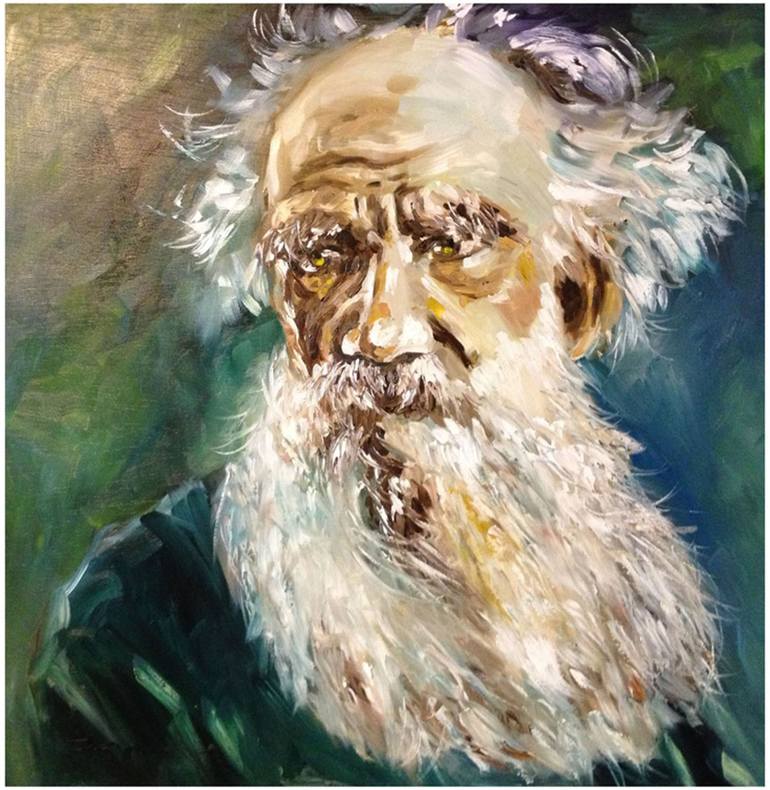Leo Tolstoy Archive
Written: 1904
Source: "Fables for Children," by Leo Tolstoy, translated from the original Russian and edited by leo Wiener, assistant Professor of Slavic Languages at Harvard University, published by Dana Estese Company, Boston, Edition De Luxe, limited to one thousand copies of which this is no. 411, copyright 1904, electrotyped and printed by C. H. Simonds and Co., Boston, Massachusetts, USA.
Transcription/Markup: Andy Carloff
Online Source: RevoltLib.com; 2021

Go out in the winter on a calm, frosty day into the field, or into the woods, and look about you and listen: all around you is snow, the rivers are frozen, dry grass blades stick out of the grass, the trees are bare,—nothing is moving.
Look in the summer: the rivers are running and rippling, in every puddle the frogs croak and plunge in; the birds fly from place to place, and whistle, and sing; the flies and the gnats whirl around and buzz; the trees and the grass grow and wave to and fro.
Freeze a pot with water, and it will become as hard as a rock. Put the frozen pot on the fire: the ice will begin to break, and melt, and move; the water will begin to stir, and bubbles will rise; then, when it begins to boil, it whirls about and makes a noise. The same happens in the world from the heat. Without heat everything is dead; with the heat everything moves and lives. If there is little heat, there is little motion; with more heat, there is more motion; with much heat, there is much motion; with very much heat, there is also very much motion.
Where does the heat in the world come from? The heat comes from the sun.
In winter the sun travels low, to one side, and its beams do not fall straight upon the earth, and nothing moves. The sun begins to travel higher above our heads, and begins to shine straight down upon the earth, and everything is warmed up in the world, and begins to stir.
The snow settles down; the ice begins to melt on the rivers; the water comes down from the mountains; the vapors rise from the water to the clouds, and rain begins to fall. Who does it all?—The sun. The seeds swell, and let out rootlets; the rootlets take hold of the ground; old roots send up new shoots, and the trees and the grass begin to grow. Who has done that?—The sun.
The bears and moles get up; the flies and bees awaken; the gnats are hatched, and the fish come out from their eggs, when it is warm. Who has done it all?—The sun.
The air gets warmed up in one place, and rises, and in its place comes colder air,—and there is a wind. Who has done that?—The sun.
The clouds rise and begin to gather and to scatter,—and the lightning flashes. Who has made that fire?—The sun.
The grass, the grain, the fruits, the trees grow up; animals find their food, men eat their fill, and gather food and fuel for the winter; they build themselves houses, railways, cities. Who has prepared it all?—The sun.
A man has built himself a house. What has he made it of? Of timbers. The timbers were cut out of trees, but the trees are made to grow by the sun.
The stove is heated with wood. Who has made the wood to grow?—The sun.
Man eats bread, or potatoes. Who has made them grow?—The sun. Man eats meat. Who has made the animals, the birds to grow?—The grass. But the grass is made to grow by the sun.
A man builds himself a house from brick and lime. The bricks and the lime are burnt by wood. The wood has been prepared by the sun.
Everything that men need, that is for their use,—all that is prepared by the sun, and on all that goes much sun's heat. The reason that men need bread is because the sun has produced it, and because there is much sun's heat in it. Bread warms him who eats it.
The reason that wood and logs are needed is because there is much heat in them. He who buys wood for the winter, buys sun's heat; and in the winter he burns the wood whenever he wants it, and lets the sun's heat into his room.
When there is heat, there is motion. No matter what motion it may be,—it all comes from heat, either directly from the sun's heat, or from the heat which the sun has prepared in the coal, the wood, the bread, and the grass.
Horses and oxen pull, men work,—who moves them?—Heat. Where does the heat come from?—From the food. And the food has been prepared by the sun.
Watermills and windmills turn around and grind. Who moves them?—Wind and water. And who drives the wind?—Heat. And who drives the water?—Again heat. Heat raises the water in the shape of vapor, and without this the water would not be falling down. A machine works,—it is moved by steam. And who makes steam?—Wood. And in the wood is the sun's heat.
Heat makes motion, and motion makes heat. And both heat and motion are from the sun.